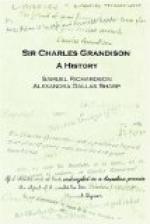A state of suffering, said Lady L——, had probably humbled the spirit of the poor wife into perfect meekness and patience.
You observe rightly, replied Sir Charles: And surely a most kind disposition of Providence it is, that adversity, so painful in itself, should conduce so peculiarly to the improvement of the human mind: It teaches modesty, humility, and compassion.
You speak feelingly brother, said Lady L——, with a sigh. Do you think, Lucy, nobody sighed but she?
I do, said he. I speak with a sense of gratitude: I am naturally of an imperious spirit: But I have reaped advantages, from the early stroke of a mother’s death. Being for years, against my wishes, obliged to submit to a kind of exile from my native country, which I considered as a heavy evil, though I thought it my duty to acquiesce, I was determined, as much as my capacity would allow, to make my advantage of the compulsion, by qualifying myself to do credit, rather than discredit, to my father, my friends, and my country. And, let me add, that if I have in any tolerable manner succeeded, I owe much to the example and precepts of my dear Dr. Bartlett.
The doctor blushed and bowed, and was going to disclaim the merit which his patron had ascribed to him; but Sir Charles confirmed it in still stronger terms: You, my dear Dr. Bartlett, said he, as I have told Miss Byron, was a second conscience to me in my earlier youth: Your precepts, your excellent life, your pure manners, your sweetness of temper, could not but open and enlarge my mind. The soil, I hope I may say, was not barren; but you, my dear paternal friend, was the cultivator: I shall ever acknowledge it—And he bowed to the good man; who was covered with modest confusion, and could not look up.
And think you, Lucy, that this acknowledgment lessened the excellent man with any one present? No! It raised him in every eye: and I was the more pleased with it, as it helped me to account for that deep observation, which otherwise one should have been at a loss to account for, in so young a man. And yet I am convinced, that there is hardly a greater difference in intellect between angel and man, than there is between man and man.
LETTER XXIII
Lady G——, to miss
Byron
Thursday, April 13.
For Heaven’s sake, my dearest Harriet! dine with us to-day; for two reasons: one relates to myself; the other you shall hear by and by: To myself, first, as is most fit—This silly creature has offended me, and presumed to be sullen upon my resentment. Married but two days, and shew his airs!—Were I in fault, my dear, (which, upon my honour, I am not,) for the man to lose his patience with me, to forget his obligations to me, in two days!—What an ungrateful wretch is he! What a poor powerless creature your Charlotte!
Nobody knows of the matter, except he has complained to my brother—If he has! But what if he has?—Alas! my dear, I am married; and cannot help myself.




